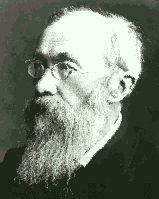
|
Wilhelm Wundt
(1832-1920)
German Philosopher & Psychologist
|
Ideas and Interests
Wundt established the first laboratory in
the world dedicated to experimental psychology. This laboratory became
a focus for those with a serious interest in psychology, first for German
philosophers and psychology students, then for American and British students
as well. All the psychological laboratories that followed were closely
modeled in their early years on the Wundt model.
Wundt's revolutionary approach to psychological
experimentation moved psychological study from the domain of philosophy
and the natural sciences and began to utilize physiological experimental
techniques in the laboratory. He pioneered the concept of stating
mental events in relation to objectively knowable and measurable stimuli
and reactions. Wundt perceived psychology as part of an elaborate philosophy
where mind is seen as an activity, not a substance. His greatest contribution
was to show that psychology could be a valid experimental science. His
influence in promoting psychology as a science was enormous. As noted above,
a primary preoccupation of many early psychologists, such as Wundt and
Fechner, was with the measurement of powers of sensory discrimination,
resulting in the theory and methodology of psychophysics, the science of
quantitative relations between physical magnitudes and sensations. This
interest with measurements led Wundt to develop what would be the foundation
for Binet's scale of intelligence. Binet had developed a scale where specific
tasks were directly correlated to different levels of abilities or a mental
age.
http://www.indiana.edu/~intell/wundt.html

